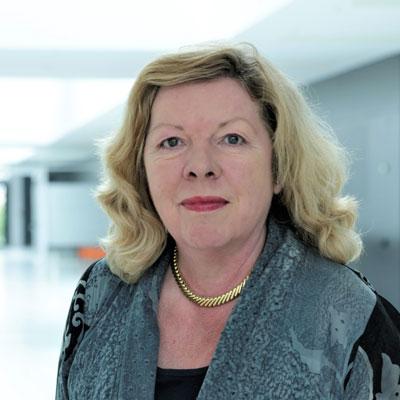
Nanny Drechsler studied musicology, philosophy, and art history as part of a wide-ranging arts curriculum at the University of Music Freiburg. She graduated in 1985 with a thesis on "The Function of Music in German Broadcasting from 1933 to 1945." In the same year, she completed a degree course in Media Education at the University of Education, Freiburg, followed by a dissertation on music of Italian Futurism, which received the University Prize for special achievement. Thereafter, Nanny Drechsler was a lecturer at the University of Music Freiburg, at the University of Education and the University of Freiburg Musicology Institute. Combining these responsibilities to advance a group research project on music in concentration camps, she offered a comprehensive focus on rediscovering long-forgotten composers during the Third Reich.
In 1992, Nanny Drechsler became professor of music theory at the University of Music Karlsruhe. Gender studies is one focal point of her artistic and scientific interests. In 2002, Nanny Drechsler was awarded the noted Aigner-Rollett-Guest Professorship for Women’s and Gender Studies at the University of Graz, where she developed new concepts of music education with interdisciplinary concert programs and seminars. In coordination with Roswitha Sperber, founder of the celebrated Heidelberg Prize for Female Artists, she continued working in related efforts for a decade, eventually becoming especially dedicated to promoting contemporary female composers. As longtime Equal Opportunity Officer at the Karlsruhe University of Music, Nanny Drechsler is fully committed to the principle of gender equality in research and teaching, seeing it as a far-reaching opportunity for the future of students. She pursues this goal, emphasizing an intercultural perspective for joint pedagogical, artistic, and academic cooperation. Her Time Paths program concept documents as a continuous cycle the history of the University of Music Karlsruhe as a space for sound and experience, starting with the work of the Karlsruhe composer, critic, and professor of music theory and composition Eugen Werner Velte as it still impacts the lives and work of his former students today. In the future, the concept will be expanded to include new formats, combining musicology, music theory, composition, and interpretation, creating a window of resonance for the university's 50th anniversary in 2021.
Research interests: Systematic musicology, music theory, music of the 20th and 21st centuries, gender studies, critical theory, interdisciplinary approaches to music and painting as well as music and sculpture, and performance research.